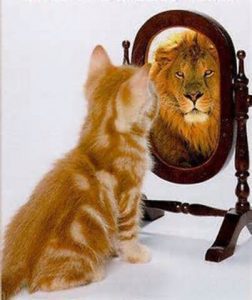I Love Me, I Love Me Not…
July 21, 2015
by Kim Childs, CPPC
In June, I gave myself a 30-day challenge to look in the mirror each morning and say, “I love you.” It seemed like a simple practice. But as the saying goes, simple does not always mean easy.
I’d heard about this exercise from author Louise Hay, who advocates positive self-talk and affirmations for physical and emotional healing and well-being. In her words: “You have been criticizing yourself for years, and it hasn’t worked. Try approving of yourself and see what happens.”
And so I tried the exercise, and discovered that my inner critic can be surprisingly alert and vocal at 7 a.m.
In general, I treat myself well, appreciate my abilities and strengths, and practice good self-care as a coach and teacher who aims to walk her talk. A recent year of intense personal challenges grew my self-compassion and self-forgiveness, and my training in Positive Psychology helps me to dispute pessimistic and self-critical thoughts and replace them with encouragement.
Nonetheless, some days I found it surprisingly hard to unconditionally love myself as I faced that mirror.
This was especially true when I focused on wrinkles, recalled regrettable words or actions, or felt inadequate or guilty for not doing more toward my goals. Some days, “I love you” was followed by such phrases as “and I forgive you” or “You’re doing the best you can” or “You can do better today” or “You have really good intentions.”
While it might look and sound a little silly, I believe that a self-love practice like this primes us for receiving the good we desire in life. Some mornings, it boosted my mood for the entire day.
“In order to thrive in life, we have to find a way to regard ourselves with respect and some consistent positive self-regard,” says Maria Sirois, a faculty member at the Kripalu Center for Yoga and Health. “For many of us, this is challenging, as we have grown into the habit of self-criticism or even self-loathing, and it might seem impossible to find a way back to loving and forgiving ourselves for not being perfect.”
Sirois says the journey toward greater positive self-regard is one of small steps, taken each day. “It might look like being honest about what we want to do with our free time or who we really want to spend it with,” she says. “It might mean saying no to old habits, such as watching hours of TV each night, and yes to reading, dancing, or meditating.”
Having also done the mirror exercise in her 20s, Sirois reports, “That practice became the foundation of learning to put myself in the equation of my own life—not to negate the importance of others, but to include myself in the formula of my days and balance that with care for others.”
Friends who joined my 30-day challenge on Facebook added personalized mantras and affirmations, and drew lipstick hearts on the mirror. A colleague shared that he began a similar practice several years ago to overcome harsh self-criticism, and it worked. “I did this religiously every night for at least half a year, saying, ‘I appreciate you, I respect you, I love you,’” he recalls. “At some point, I noticed the internal harshness had abated, and it was okay to stop because the result I sought had been achieved.”
When I talk about self-love with students and clients, I sometimes get blank looks, complaints that it’s too hard, or protests that it’s more important to love and care for others. Christine Arylo, co-author of Reform Your Inner Mean Girl, says that we should consider love an inexhaustible resource, whether directed at ourselves or others. “There is an infinite supply of love and, the more you love yourself, the more capable and free you are to unconditionally love others,” says Arylo. “If you are taking care of everyone else’s needs and sacrificing what you need and desire over and over again, you’ll become resentful, depleted, or angry—the opposites of love.”
To strengthen self-love, Arylo says we can first become aware of where we’re weak or strong in loving ourselves. “For example, you might be strong in self-esteem and weak in self-respect, so you’re a superstar at work and a disaster in your love life,” she explains. “Or perhaps you’re strong in self-empowerment but weak in self-care, so you manifest your dreams but you do so at the cost of your health.”
Arylo recommends selecting one aspect of self-love to grow at a time, and making choices that support it. If you choose self-care, find ways to treat yourself well and honor your own needs. To boost self-esteem, do something brave or challenging each day, no matter how seemingly small. To grow self-respect, act with integrity.
As for me, I plan to continue this practice until I wholeheartedly believe what I’m saying to the mirror each morning, making it my job to cheer on the goodhearted, imperfectly human woman in the reflection.
Kim Childs, CPPC, is a Certified Life and Career Coach specializing in Positive Psychology, Creativity, and Midlife Transitions. Click here to learn more and schedule an initial consultation.
1 Comment
Mary Zaremba
July 23, 2015
Hi Ms. Kim,
What courage, woman! At least from where I sit, reading this. Which, by the way, is nowhere near a mirror!! I have come across this exercise before in its shorter versions as well as what you are doing (over a month) and regardless of what version, it scares the beh-geebers out of me. So I applaud you for your commitment to this exercise – facing yourself, with yourself, about yourself – which of course is at the same time about all of us!! Thanks for sharing this…
XO Mary